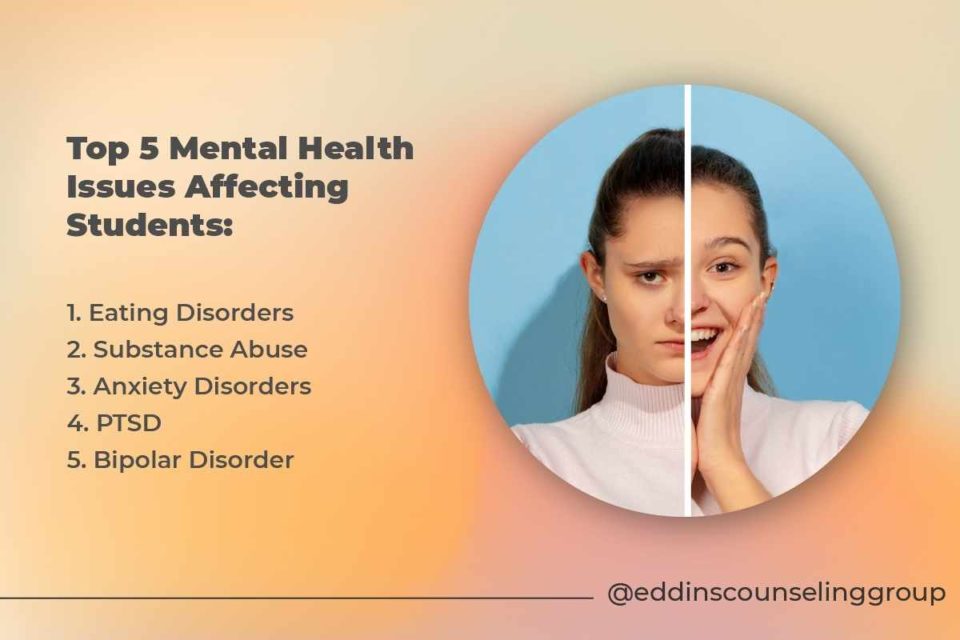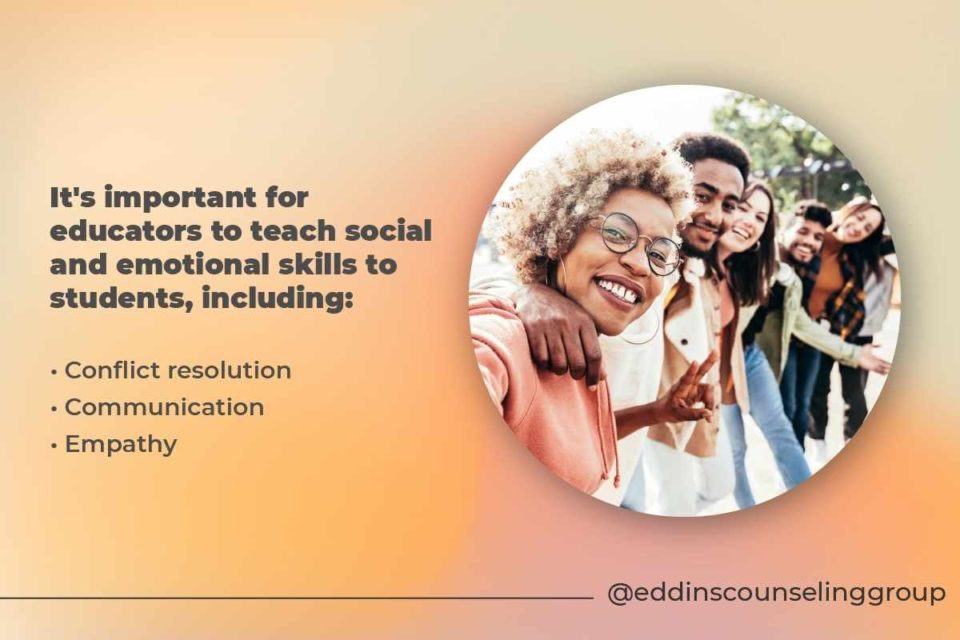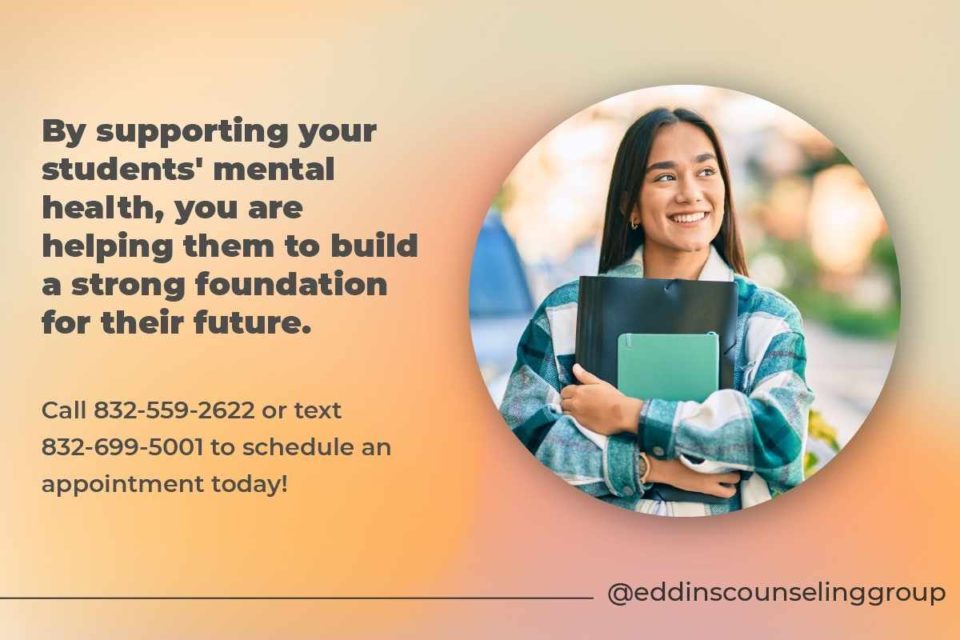August 9, 2022
Top 5 Mental Health Challenges Facing Students
Written by Guest Author
Posted in Emotional & Mental Health, Parenting & Family and with tags: mental health challenges, students

According to the National Institute of Mental Health, approximately 1 in 5 adults in the United States live with a mental illness. For college students, that number may be even higher.
The pressures of academia and the stress of finding a job after graduation can take a toll on mental health.
In addition, many students are away from home for the first time and may not have a support system in place. As a result, college students are at an increased risk of developing mental health disorders.
What are the Top 5 Mental Health Issues among Students?
Most people associate mental health with depression, anxiety, and bipolar disorders. However, many other mental health issues can affect students. Here are five of the most common ones:
1. Eating Disorders
College students face many new challenges that can lead to stress and anxiety. For some students, these challenges can trigger an eating disorder.
Eating disorders are serious mental illnesses that can profoundly impact a person’s physical and emotional health. Many college students with eating disorders struggle with low self-esteem, body image issues, and negative thoughts about food and their bodies.
Eating disorders can also lead to isolation, loneliness, and academic difficulties. If left untreated, eating disorders can have serious consequences, including organ damage, malnutrition, and even death.
Thankfully, there is help available for students struggling with eating disorders. Counseling and therapy can be incredibly helpful in treating eating disorders.
If you or someone you know is struggling with an eating disorder, please reach out for help. There is no shame in seeking treatment, and recovery is possible.
2. Substance Abuse
Substance abuse among students is all too common. Many students turn to drugs or alcohol to cope with the stress of school, friendships, and family life. Others may be tempted by peer pressure or the desire to fit in.
Whatever the reason, substance abuse can have a devastating impact on student’s lives. Substance abuse can lead to poor grades, health problems, and even addiction.
In some cases, it can even lead to death. Students who do not receive treatment for substance abuse are at risk for these and other serious consequences.
It doesn’t have to be this way. There is help available for students struggling with substance abuse. Counseling, therapy groups, and 12-step programs can all be helpful in treating substance abuse and addiction.
3. Anxiety Disorders
Anxiety disorders are the most common mental health condition in the United States, affecting 40 million adults each year. Anxiety can be especially debilitating for students, affecting their ability to learn and succeed in school.
There are a number of factors that contribute to the high incidence of anxiety among students. First, transitioning from elementary to middle school or middle to high school can be stressful for many kids.
In addition, today’s students face increasing pressure to succeed academically, which can lead to anxiety about grades and test scores. Social media is another contributing factor, as it can fuel comparison and self-doubt.
Finally, many students deal with major life changes, such as divorce or the death of a loved one, which can trigger anxiety. While there is no easy solution to this problem, it is important to raise awareness of the issue and support students struggling with anxiety. By working together, we can help reduce the incidence of anxiety disorders among students and ensure that every child has the opportunity to succeed.
4. PTSD
It’s estimated that 1 in 11 young people will experience post-traumatic stress disorder (PTSD) at some point in their lives. PTSD can occur after someone has been through an event that was traumatizing to them.
For many students, the start of the school year can be a trigger for PTSD symptoms. Going back to school can bring up memories of past trauma, and the anxiety of starting a new year can be overwhelming.
PTSD can also be triggered by seeing someone who reminds the student of their attacker or by hearing about someone else’s experience of trauma. For some students, simply walking into a school building can be enough to trigger a PTSD response.
It’s important to remember that everyone responds to trauma differently, and there is no “right” or “wrong” way to feel. If you are struggling with symptoms of PTSD, please reach out for help. So many resources that can support you are available.
5. Bipolar Disorder
Bipolar disorder is a mental illness that causes extreme mood, energy, and behavior changes. People with bipolar disorder can have periods of intense elation, called manic episodes, followed by periods of deep depression.
Bipolar disorder is a serious condition that can be debilitating, but it is also treatable.
Although bipolar disorder can occur at any age, it is most commonly diagnosed in young adults.
This may be due in part to the fact that bipolar disorder often begins in adolescence or early adulthood. About 2.8% of American adults are estimated to suffer from bipolar disorder.
However, the condition is often under-diagnosed, so the actual number may be higher. There are several reasons why bipolar disorder is common among students.
One reason is that the symptoms of bipolar disorder can be triggered by stress. College can be stressful, as students juggle academics, social life, and personal responsibilities.
Additionally, college students are more likely to party and use drugs and alcohol than their non-college counterparts. This substance abuse can also lead to or exacerbates symptoms of bipolar disorder.
If you or someone you know is struggling with bipolar disorder, know that there is help available. Campuses and the community usually have plenty of resources that can support you.
What Strategies can Parents use to Support Children Experiencing Mental Health Concerns?
Even though mental health challenges are common among students, there are many strategies that can be used to support a child who is struggling.
Here are a few general tips for parents:
Talk to your child about their concerns
It’s important to encourage open communication with your child about their mental health. This can help them feel more comfortable talking about their symptoms and experiences.
By talking to your child, you can also better understand what they are going through. It is important to listen to your child without judgment and to let them know their feelings are valid.
If your child is reluctant to talk, you can try normalizing the conversation by sharing your own experiences with mental health. Ultimately, the goal is to create an open and supportive environment where your child feels comfortable talking about their mental health.
Connect them with Resources
When it comes to mental health, it’s important to remember that you are not alone. Plenty of resources are designed just for children and families dealing with mental health issues.
These include therapy, medication, support groups, and hotlines. You can use these to help your child if they’re struggling with mental health issues.
In addition, there are many community organizations that can provide support and assistance. Don’t hesitate to reach out for help if you feel you need it. Remember, you are not alone in this.
Help Them Develop a Support System
A supportive network of family and friends can be essential for someone dealing with mental health issues. This support system can provide love and understanding when your child is battling a mental health issue.
Additionally, this support system can help your child feel less alone in their struggles and provide practical assistance, such as help with childcare or transportation.
If you notice that your child is struggling with mental health issues, one of the best things you can do is to encourage them to develop a supportive network. This network can make all the difference in helping your child manage their mental health and live a happy and healthy life.
Encourage Healthy Coping Mechanisms
It’s important to encourage healthy coping mechanisms for your child when they are struggling with mental health issues. This can help them deal with stress in a more positive and proactive way.
Some of the most popular coping mechanisms that may help include; creative outlets like art or music, yoga or other relaxation techniques, and deep breathing exercises. By encouraging your child to engage in these activities, you are helping them to take control of their mental health and wellbeing. This is a very positive step in managing mental health issues.
Consider Seeking Professional Help
If you are concerned about your child’s mental health, it is important to consider seeking professional help. A mental health professional can assess your child’s symptoms and develop a treatment plan.
This may include therapy, medication, or a combination of the two. It is also important to involve your child in their treatment plan as much as possible. This will help them feel empowered and motivated to change their lives.
The Role of Educators in Supporting Students’ Mental Health
Educators play a vital role in supporting students’ mental health. They can provide a safe and supportive environment for students to share their concerns.
Here are five more ways you can support your students’ mental health:
1. Promote Positive Social Interactions
One of the best things you can do to support your students’ mental health is to promote positive social interactions. This means creating an environment where students feel comfortable interacting with each other.
You can foster a sense of community in your classroom and encourage students to work together. Additionally, you can model positive social interactions for your students. This will help them to develop healthy relationships with their peers.
2. Teach Social and Emotional Skills
It’s important to teach social and emotional skills to your students. These skills can help them to navigate difficult situations and maintain positive relationships.
Some social and emotional skills you can teach your students include conflict resolution, communication, and empathy. By teaching these skills, you are helping your students develop a strong mental health foundation.
3. Help Them Develop a Positive Self-image
One of the best things you can do for your student’s mental health is to help them develop a positive self-image. This can be done by encouraging them to celebrate their accomplishments and unique qualities.
You can also help your students develop a positive self-image by teaching them healthy coping mechanisms and dealing with stress positively. By fostering a positive self-image, you are helping your students build a strong mental health foundation.
4. Encourage Positive Coping Mechanisms
It’s important to encourage positive coping mechanisms for your students when they are struggling with mental health issues. This can help them deal with stress in a more positive and proactive way.
Some healthy coping mechanisms include exercise, journaling, and relaxation techniques. By encouraging your students to engage in these activities, you are helping them to take control of their mental health and wellbeing. This is a very positive step in managing mental health issues.
5. Don’t Be Afraid to Ask for Help
If you are concerned about a student’s mental health, don’t be afraid to ask for help. There are many resources that educators who are looking to support their students’ mental health can use. By seeking help, you are taking a very important step in supporting your students’ mental health.
Summing Up
Mental health is a vital part of every student’s life. By supporting your students’ mental health, you are helping them to build a strong foundation for their future.
Get started with the help of an Eddins Counseling Group therapist in any of our locations: Houston, Montrose, or Sugar Land.
Author Bio
Dennis Lodge is a freelance academic writer at Superiorpapers and EssayWritingLand. He’s also a blogger and copywriter who produces interesting and fact-based material on a variety of topics, including career, and education.
Grounding & Self Soothing
Get instant access to your free ebook.
Why You Feel This Way
Get instant access to your free ebook.




























